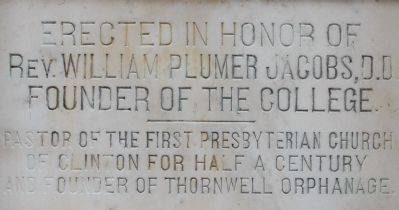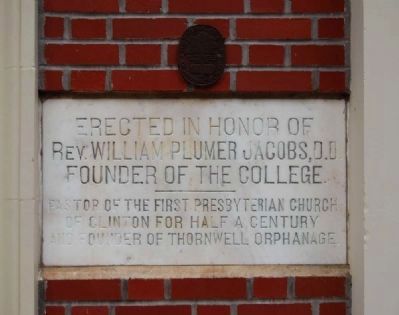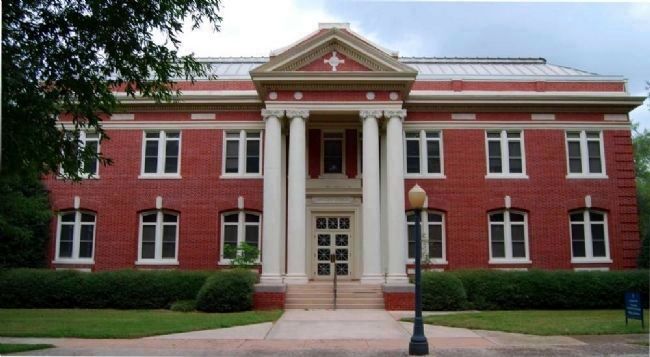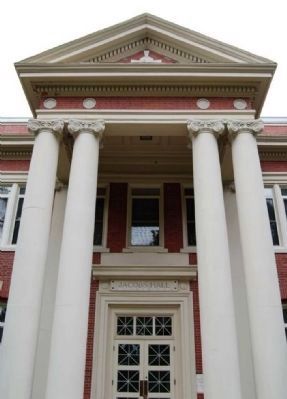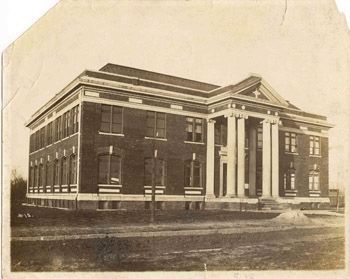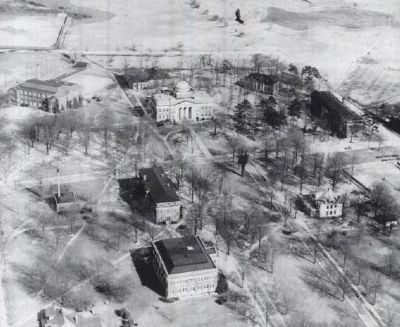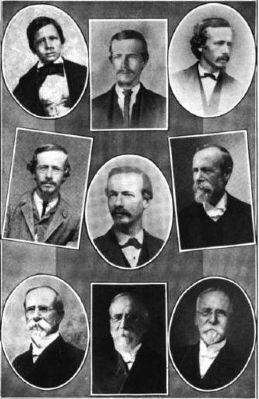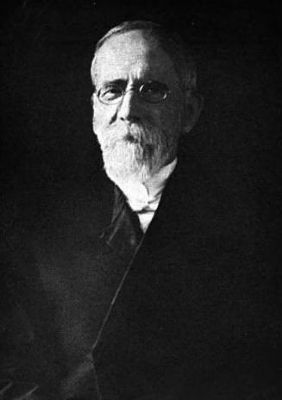Clinton in Laurens County, South Carolina — The American South (South Atlantic)
Jacobs Hall
Rev. William Plumer Jacobs, D.D.
Founder of the College
-----------
Pastor of the First Presbyterian Church
of Clinton for half a century
and founder of Thornwell Orphanage
Topics. This historical marker is listed in these topic lists: Charity & Public Work • Churches & Religion • Education.
Location. 34° 27.917′ N, 81° 52.617′ W. Marker is in Clinton, South Carolina, in Laurens County. Marker is on South Broad Street. Marker is located to the right of the front entrance. The building is located on the campus of Presbyterian College, within the boundaries of the Thornwell-Presbyterian College Historic District. Touch for map. Marker is in this post office area: Clinton SC 29325, United States of America. Touch for directions.
Other nearby markers. At least 10 other markers are within walking distance of this marker. Presbyterian College Armed Forces Memorial (within shouting distance of this marker); Mrs. Lillian G. Brown (within shouting distance of this marker); American Flag Pole (within shouting distance of this marker); Davison McDowell Douglas (within shouting distance of this marker); The Reverend William Plumer Jacobs (about 600 feet away, measured in a direct line); Malcolm A. MacDonald (approx. 0.3 miles away); William Plumer Jacobs, D.D., LL.D. (approx. 0.3 miles away); Eugene Blakely Sloan (approx. 0.4 miles away); James Ferdinand Jacobs (approx. 0.4 miles away); Clinton Veterans Monument (approx. 0.6 miles away). Touch for a list and map of all markers in Clinton.
Also see . . .
1. Presbyterian College. Official website of Presbyterian College, Clinton, SC. (Submitted on September 30, 2008, by Brian Scott of Anderson, South Carolina.)
2. Presbyterian College. Presbyterian College is a private liberal arts college in Clinton, South Carolina, USA. Presbyterian College, or PC, is affiliated with the Presbyterian Church USA. (Submitted on October 17, 2009, by Brian Scott of Anderson, South Carolina.)
3. First Presbyterian Church, Clinton, SC. Official website of the First Presbyterian Church, Clinton, SC. (Submitted on October 17, 2009, by Brian Scott of Anderson, South Carolina.)
4. Thornwell Home for Children. The Thornwell Home for Children in Clinton, South Carolina, has been taking care of children and youth in need since its founding on October 1, 1875. (Submitted on September 30, 2008, by Brian Scott of Anderson, South Carolina.)
5. Thornwell-Presbyterian College Historic District. The Thornwell-Presbyterian College Historic District comprises the historic cores of Presbyterian College and the Thornwell Home and School for Children, together with the adjacent residential streets. (Submitted on September 30, 2008, by Brian Scott of Anderson, South Carolina.)
Additional commentary.
1. About Jacobs Hall
This two story brick building was built in 1915 in the Georgian Revival Style. A colossal Ionic portico with paired columns centers the facade. The first floor windows have segmented brick arches with projecting keystones. A full Ionic entablature with a brick frieze is carried around the building. (Source: National Register nomination form.)
— Submitted October 17, 2009, by Brian Scott of Anderson, South Carolina.
2. William Plumer Jacobs
JACOBS, REV. WILLIAM PLUMER, D.D., pastor of the Presbyterian church, at Clinton, South Carolina, one of the founders of the Presbyterian college, at Clinton, and of the Thornwell orphanage, often a commissioner to the general assembly of his church, and for twenty-five years presbyterial clerk,—a preacher and pastor known and loved by hundreds who as young people at college or in the orphanage, have come within reach of his helpful influence,—was born at Yorkville, South Carolina, March 15, 1842. His father was the Rev. Ferdinand Jacobs, D. D., president of Laurensville college, and of the Lucy Cobb institute, at Athens, Georgia,—a minister whose persistent devotion to duty and unswerving fidelity to every trust committed to him won him many friends and admirers and made his life an inspiration to his son. Mrs. Mary (Redbrook) Jacobs, his wife, died when their son William was not quite three years old. The Jacobs family were among the earliest settlers of Maryland, coming from England about 1646. Thomas Jacobs, the great grandfather of Doctor W. P. Jacobs, was killed in the battle of German town.
His early boyhood was passed in the city of Charleston from 1848 until 1861. His health was not vigorous, and his love of books, especially of language study, of astronomy, and of the study and practice of shorthand, were perhaps more intense than they would have been if physical weakness had not cut him off from many boyish sports and occupations out-of-doors. He says of his boyhood: "I did not have many regular tasks involving manual labor, as I should have had. My habits were sedentary, my character was studious." Like many another strong character in the Southland of his time of life, in his boyhood and youth he was a constant reader of Bunyan, Shakespeare and Milton, and he was profoundly influenced by these masters of the art of living and of expressing life. History and natural science also had a deep and enduring interest for him.
His studies were pursued at Carroll's academy, Charleston, F. R. Goulding's North Georgia school, and Charleston college, from which last named institution he received the degrees of A. B. and A. M. The War between the States found him eager to serve his state, and he volunteered three times, but was in each instance rejected because of physical disability.
In 1864 he was graduated from the Columbia Theological seminary. He became pastor of the Presbyterian church at Clinton, where so large a part of his life has been passed in that active ministry to which he still gives all his time and strength.
In 1865, on April 20, he married Mary J. Dillard, daughter of Doctor James H. Dillard, of Laurens, South Carolina. They have had five children, all of whom are living in 1907.
In recognition of his useful and honorable career, Erskine college some years since conferred on him the honorary degree of Doctor of Divinity. He says: "The business of my life has been the building up of the Clinton Presbyterian church and ministering to it; the founding of the Clinton Presbyterian college; the founding of the Thornwell orphanage; and the founding of 'Our Monthly.' Believing it to be my duty to my country to vote early and for the best man, I have always been prompt at the polls, and have contended against every form of civic dishonor."
In politics he is a Democrat. He is a Mason. He has published (besides several catechisms for children, two of which have been translated into Japanese,) two volumes: "The Lord's Care" and "To Jerusalem" (1895).
To young people who aim at success he writes: "A vigorous, faithful, self-sacrificing devotion to the duty of the hour, without regard to weariness or to the pay, will make a man of him that dares it. That is success!"
He adds: "I think the best thing I have ever done was to strive to impress high ideals of character and of life upon many hundreds of boys and girls who came under my protecting care. As pastor and Sunday school superintendent for over forty years, and as manager of the Thornwell orphanage for over thirty years, and through the college and the press, my one endeavor has been to lead the youth about me to be true, to do the right thing always, to honor all good men and women, and to honor and obey God. I thank God for such success as I have had, and I mourn over my failures." (Source: Men of Mark in South Carolina, Volume III by James Calvin Hemphill, 244-245.)
— Submitted October 17, 2009, by Brian Scott of Anderson, South Carolina.
3. William Plumer Jacobs
William Plumer Jacobs lived a few months beyond the age of seventy-five, and his entire life was a singular consecration to work and service in behalf of his fellowmen.
He was born at Yorkville, South Carolina, March 15, 1842, son of Ferdinand and Mary Elizabeth (Redbrook) Jacobs. His great-grandfather, Pressley Jacobs, was a native Virginian and was a member of the same Masonic lodge with George Washington. The grandfather, Thomas Jacobs, was also a Virginian. Rev. Ferdinand Jacobs was a minister of the Southern Presbyterian Church, at one time was pastor of the church at Yorkville and was also head of the Yorkville Female College, which he founded more than three quarters of a century ago. During the boyhood of William Plumer Jacobs his father removed to Charleston and established a school for young ladies at the corner of King and Vanderhorst Street. William Plumer Jacobs was graduated from the Charleston College in 1861, receiving the Bachelor of Arts degree. He had already made the choice of his life work, and entering the Columbia Theological Seminary at the state capital he graduated in 1864 and was licensed as a Presbyterian minister. In the same year he was appointed to his first duties as pastor of a group of three country churches in Laurens County. The most promising of the three churches was in the little hamlet of Clinton, whose population was only about 250 souls. He was the only pastor in the town, and was the first pastor of that church.
At the close of the war and the beginning of reconstruction period Clinton was by no means an attractive home for a man of the cultured tastes possessed by the late Doctor Jacobs. The village was full of bar rooms and gambling houses, and the entire commercial and civic morale of the town was declining under the devastating influence of the reconstruction period. Its single railroad was forced to stop operation for several years. With a great singleness of purpose and courage Doctor Jacobs went about doing his work, and in a few years made the critical choice of his career. He declined a flattering call to a much stronger church, and determined to identify himself permanently with the people of Clinton. This decision suggests that many men in obeying the injunction not to put their light under a bushel have set a very small candle on a high hill, whereas Doctor Jacobs, choosing to let his light shine from a little village, in time made his radiance a lighthouse of Christian influence and power extending well over the state and the South. For nearly half a century he was pastor of the little church, and in that time had the pleasure of seeing it prosper and grow to become one of the largest Presbyterian churches in the state and the mother of many churches.
One of the first objectives of his moral crusade was the bar rooms, and after a severe struggle he got the town voted dry. This operation had to be repeated several times until eventually a petition from the townspeople caused the Legislature to enact a provision declaring the community dry for loo years. Since that date no whisky has been sold legally in Clinton, and those of an older generation disposed to drunkenness have gradually disappeared, leaving the town a model of sobriety.
While never neglecting an opportunity to influence men's hearts and character, Doctor Jacobs was equally active in constructive measures for the physical well being of his community. He was a leader in securing the reconstruction of the old Laurens railroad and later of the Seaboard Air Line through Clinton. Perhaps the best monument to his enterprise was founding the Thornwell Orphanage, which became the largest Presbyterian orphanage in America. This orphanage is a model of enlightened charity and from the beginning has been operated under the theory of giving a real home as well as a school to orphan children and graduating its children to take useful places in the world as capable Christian men and women.
Doctor Jacobs is also remembered as the founder of the Presbyterian College of South Carolina, long one of the leading denominational institutions of the state. Some years ago, after his official connection with the college had been severed, he was honored with the degree Doctor of Laws by the Presbyterian College. He received the degree Doctor of Divinity from Erskine College.
While his working days were filled with tasks he found time to remain a scholar to the end of his days. He developed a large private library and was a helpful influence in the establishment of various public libraries, at least three institutions of that nature being credited to his influence.
His career also served to call attention to the comparatively brief history of the science or art of shorthand. While various methods of shorthand writing have been in use for several centuries, the modern system is usually ascribed as the invention of an Englishman named Pittman. Doctor Jacobs was an early student of the Pittman method and became a regular correspondent of Mr. Pittman, who once complimented his American pupil as being the best shorthand writer in this country. In his earlier years Doctor Jacobs was a reporter for a number of publications. His historic work in that line was reporting the Secession Convention when South Carolina left the Union.
For many years he was historian for the Synod of South Carolina, was clerk of Enoree Presbytery, but the work which brought him the love and veneration of a wide circle was what he did in connection with the Thornwell Orphanage. Long before he died this was regarded as a model charity, and hundreds made pilgrimages to Clinton in order to study his methods of training and educating orphan children. While he loved all things human, his love of children was his dominant characteristic. The struggle he made to protect orphan children from the cold and brutal handling of the old style orphan-asylum can well be selected as his very greatest achievement. On his tomb is engraved the words: "He loved God and little children," and few men have so well deserved that happy epitaph. A man of rugged convictions as to duty, fearless in carrying out his plans, he naturally made many enemies and in earlier years met with much opposition to his broad views of charity, but at the end of his life he was surrounded only with the deepest love and veneration. He was unusually unselfish, his life being rich in good works, and for himself he gave little thought. He might have accumulated a for tune through his remarkable business ability, but in the true spirit of his Master he went through life without accumulating material wealth and left nothing beyond the estate which his wife brought him.
Death came only at the very end of a busy career. It followed an extremely busy week of hard work which completed a book on the Immortality of the Soul, finished up his annual report of the Thornwell Orphanage and accomplished a great deal of other work. The day before his death he preached two very vigorous and intensely interesting sermons.
In his last years he was affected with deafness and the loss of his eyesight, but even with those handicaps he remained steadfast in his duties and responsibilities. While his death was widely mourned, it was especially regretted by hundreds of orphan children whose success in life was due to his kindly care. On another score the people of the Town of Clinton expressed their gratitude to him for the prosperity and improvement which his public spirited efforts and high ideals brought to that community.
Only a few months after his ordination as a minister and his arrival in his first pastorate in Laurens County he married Mary Jane Dillard, of Coldwater, Laurens County. They were married April 20, 1865. Their children consisted of one daughter, Florence Lee, and four sons, James Ferdinand, William States, John Dillard and Thornwell Jacobs.
The motto of his life selected in early manhood and often repeated in his diary, which he kept from the age of sixteen to the day of his death, was "Seekest thou great things for thyself? Seek them not." This motto is the key to his remarkably unselfish and wonderfully useful career. (Source: History of South Carolina, Vol. III by Yates Snowden, pgs 99-100.)
— Submitted October 17, 2009, by Brian Scott of Anderson, South Carolina.
Credits. This page was last revised on December 14, 2019. It was originally submitted on September 30, 2008, by Brian Scott of Anderson, South Carolina. This page has been viewed 1,406 times since then and 26 times this year. Photos: 1. submitted on September 30, 2008, by Brian Scott of Anderson, South Carolina. 2, 3, 4, 5, 6, 7, 8. submitted on October 17, 2009, by Brian Scott of Anderson, South Carolina.
